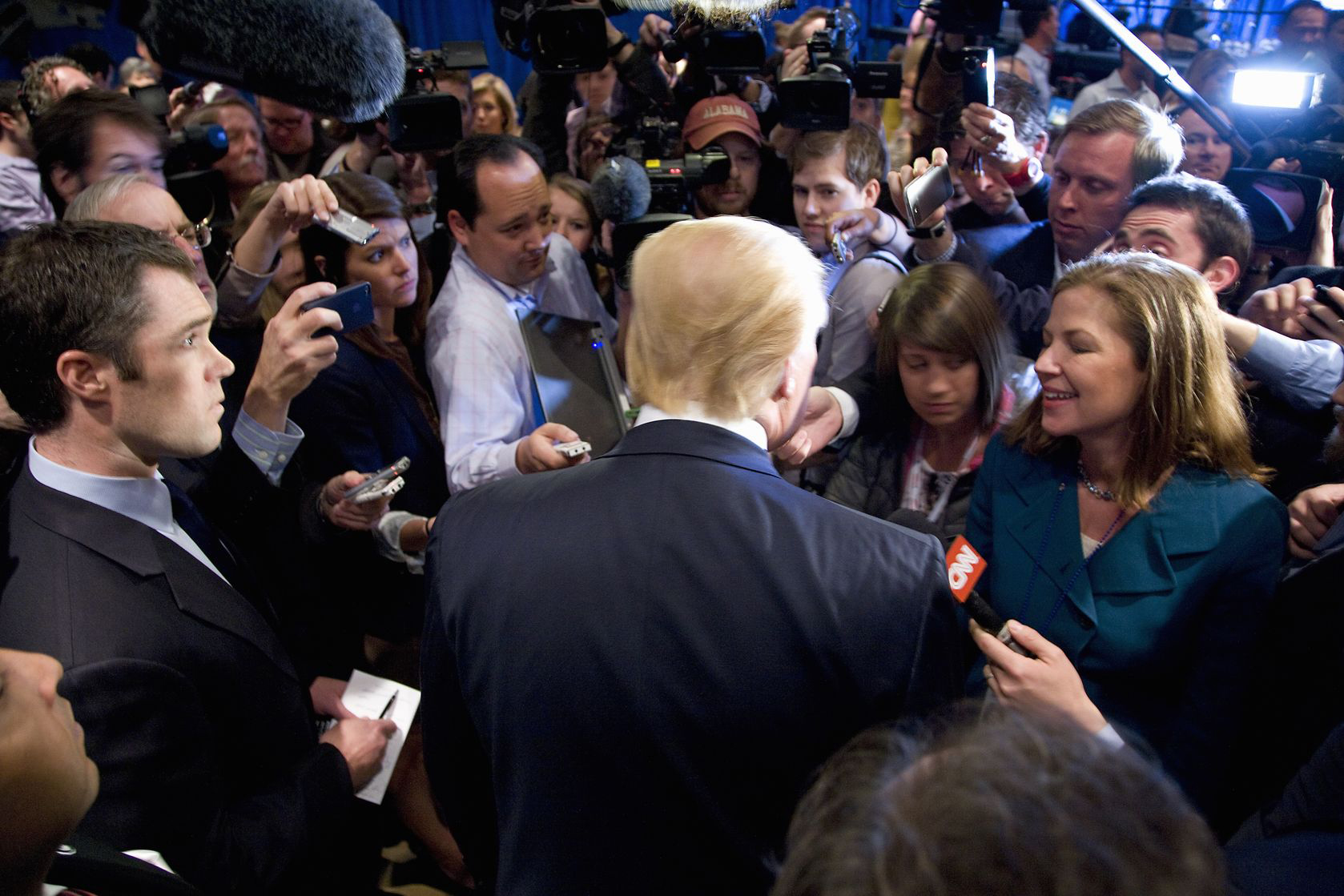With his proposals for a registry of Muslims, a ban on their entry into the country, building a wall to prevent illegal immigration, and the deportation of 11 million illegal immigrants, Donald Trump, if he were elected president, might trend the country domestically toward fascism. (His election is possible but still unlikely, because the Democrats have an intrinsic advantage on the electoral college map, and President Obama’s approval rating has begun to exceed fifty percent, traditionally a key determiner for the outcome of the election of a president’s successor.) But what would the world look like if Donald Trump actually became president?
Trump has threatened to pull out of the NATO alliance in Europe and withdraw troops from Japan and South Korea if these countries don’t pay up, and remove the U.S. nuclear umbrella from those two nations. (If the United States withdrew from NATO, the U.S. nuclear shield would also stop protecting European NATO members.) Instead, Trump has spoken of having better relations with the nuclear great powers of Russia and China. The Chinese don’t even seem worried about his proposal to impose more than 30 percent tariffs on their exports unless they play more “fairly” in the trade realm, because pro-business Republican presidents have traditionally been more friendly to China than human rights-loving Democratic chief executives. Moreover, Hillary Clinton is much more hawkish in foreign policy than Trump. Despite attempts by the interventionist U.S. foreign policy establishment and media to brand Trump’s proposals “isolationist” crazy talk, most of his foreign policy program is long overdue.
The U.S. alliance system, built to contain a rival Soviet superpower during the Cold War, is long out of date. Despite all of his swagger and bluster, Vladimir Putin controls a Russia that is a mere shadow militarily of the old USSR. Furthermore, in the early part of the Cold War, when the United States first sent its military forces back to Europe and opened its nuclear umbrella to protect the European nations from the Soviet Union, most of the downtrodden Western European countries were still cleaning up the rubble from World War II. In contrast, today, the wealthy European Union has a combined GDP of at least five times that of Russia. Furthermore, the British and French have their own nuclear weapons that could deter any Russian aggression on Western Europe. Even though the European Union’s combined GDP is greater than that of the United States, the U.S. accounts for 75 percent of the defense spending of the NATO alliance and has effectively promised to sacrifice U.S. cities to protect Western Europe from being overrun by a weaker Russia (even during the Cold War, as bad as any Soviet invasion of Western Europe would have been, sacrificing U.S. cities to stop it would have been worse for Americans).
In East Asia, the U.S. government is also planning to sacrifice New York and Chicago to save Tokyo or Seoul from a nuclear-armed China. These countries were shocked when Trump complained about their freeloading; they cited the host nation support (for example Japan provides about $2 billion a year toward the housing costs of U.S. forces there) making U.S. forces cheaper to station there than in the United States. Of course, this argument is a gross distortion, because the United States, if it didn’t need to defend these nations, could save much more by decommissioning these military units and many more stationed in the western United States allocated to East Asian defense. Nowadays, U.S. friends and allies in East Asia have a combined GDP that almost equals China and could and should be the first line of defense against China. Even allowing Japan and South Korea, responsible world citizens for many decades, to get nuclear weapons to protect themselves and their East Asian friends would be better than losing U.S. cities in any nuclear war with China.
In both Europe and East Asia, the United States could return to the long-forgotten traditional foreign policy of the nation’s founders—which was to have commercial relations with all nations but to avoid permanent and entangling alliances or political intrigue with any of them—which lasted through most of the republic’s history until the Cold War began after World War II. A return to that restrained U.S. foreign policy would instantly make U.S. relations with China and Russia much better.
Unlike countries like Russia or Germany, which have poor geographical and topographical barriers to foreign invaders, the United States may be the most intrinsically secure great power in world history—with two great oceans as vast moats, weak and friendly neighbors, and the most powerful nuclear arsenal on the planet. The only real, if low probability, threat the country currently faces is from blowback terrorist attacks from people who don’t like interventionist U.S. foreign policy abroad, mainly in the Middle East. With the recent domestic oil fracking boom restoring the United States as the number one oil producer in the world, the United States now has little justification to continue meddling in the region (if it ever did).
Donald Trump hasn’t gone quite this far in his less hawkish thinking, but we can only hope that he will if he actually makes it into the White House.

















